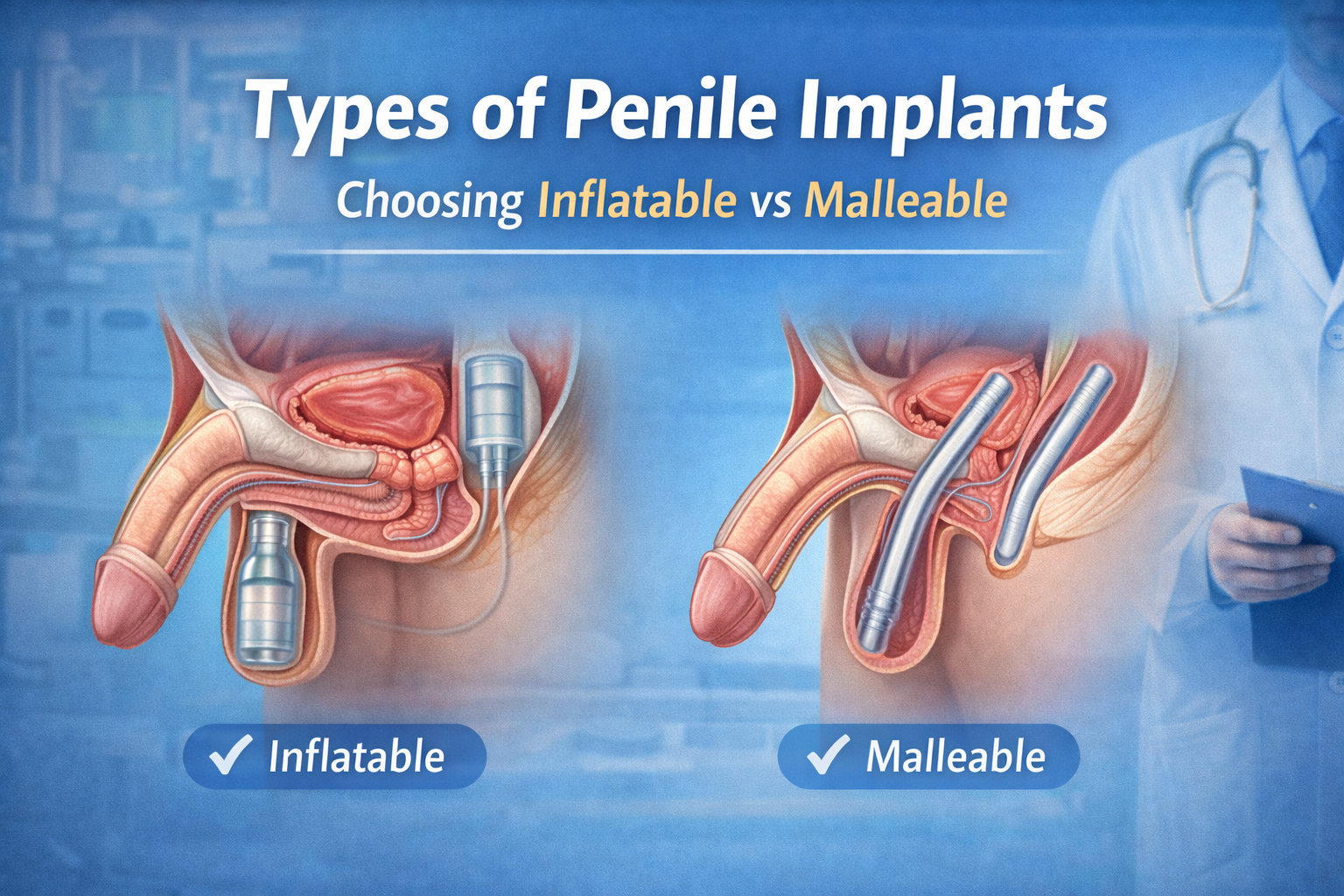

Post-sex UTIs are common—especially in women—because a shorter urethra makes it easier for bacteria like E. coli to enter the bladder. Friction during intercourse can push bacteria from the anal or vaginal area into the urinary tract. Risk increases with frequent sex, new partners, spermicides, and low estrogen after menopause.
In this guide, we cover the top 8 Doctor-Approved Tips to prevent UTIs after sex, from hydration and hygiene to probiotics and hormonal support. You’ll also learn when to consult a urologist and get answers to FAQ's about cranberry juice, probiotics, and postmenopausal care.
💡 Need expert help managing UTIs? Consult Dr. Ashish Saini, one of Delhi NCR’s leading urologists, with over 18 years of experience. Book your consultation here or connect via WhatsApp.
Understanding Post-Coital UTIs: Why Sex Can Trigger Infections
In simple terms, a UTI is an infection in any part of your urinary system – kidneys, ureters, bladder, and urethra. While men can get UTIs, they are significantly more common in women. The primary reason for this lies in anatomy: women have a much shorter urethra compared to men. This shorter distance means bacteria from the anal and vaginal areas have a shorter journey to reach the bladder, where they can multiply and cause an infection.
Sexual activity, while a natural and healthy part of life, can unfortunately act as a catalyst for UTIs. Here's why:
Bacterial Movement: During intercourse, friction and thrusting can inadvertently push bacteria, particularly E. coli (which normally resides in the gut), from the anal or vaginal region towards and into the urethra. Once inside the urethra, these bacteria can then ascend into the bladder, leading to an infection.
Proximity of Structures: The close proximity of the urethra to the vagina and anus in women makes it easier for bacteria to transfer during sexual activity.
Risk Factors: Certain factors can increase your susceptibility to post-coital UTIs:
New Sexual Partners: Introducing new bacterial strains can sometimes trigger an infection.
Frequency of Intercourse: More frequent sexual activity can increase the chances of bacterial introduction.
Spermicides and Diaphragms: These birth control methods can alter the vaginal flora, making it easier for harmful bacteria to thrive.
Menopause: A decrease in estrogen levels during menopause can thin the vaginal lining and change its pH, making women more prone to UTIs.
8 Ways You Can Do to Reduce Your Risk of a UTI After Sex?
Now that we understand the "why," let's focus on the steps that can help to Reduce Your Risk of a Uti After Sex.
1. Stay Hydrated
Drinking enough water helps prevent UTIs in two key ways: it dilutes harmful bacteria in the urinary tract and helps flush them out before they can cause an infection.
Water is your first line of defense in maintaining urinary health.
Aim for at least 8 glasses (about 2 L) daily.
Look for very pale yellow urine—anything darker means you’re slacking.
Key stat: In one study of 100+ people AFAB with recurrent UTIs, upping daily fluid intake halved recurrence rates over 12 months.
2. Prioritize Good Bathroom Hygiene to Prevent UTIs
Poor wiping technique and long baths can raise your risk of urinary tract infections (UTIs).
Always wipe front to back — stool bacteria from the rectum can enter the urethra and cause UTIs.
Use a fresh tissue every time — never wipe twice with the same one.
Take quick showers, not long baths — bath water can harbor skin bacteria that enter your urinary tract.
Choose tampons or menstrual cups — they keep the vaginal and bladder area drier than pads, lowering bacterial growth.
Consistent hygiene helps eliminate UTI-causing bacteria and protects your urinary health.
3. Empty Your Bladder—Regularly
Letting urine sit is like rolling out the welcome mat for bacteria.
- Go every 3–4 hours, even if it’s just a few drops.
- Hold ‘til you burst? That weakens your bladder’s squeeze power over time.
- Key stat: Women who habitually delay voiding are 1.5× more likely to develop UTIs.
4. Choose Breathable Underwear
Tight, synthetic undies trap heat and moisture—bacteria’s favorite climate.
- Opt for 100% cotton briefs or moisture-wicking blends.
- Change underwear daily—and immediately after workouts.
5. Pre- and Post-Sex Flush
Sex doesn’t directly “cause” UTIs, but it sure can ferry bacteria into your urinary tract.
- Before: Quick rinse or shower to wash away surface bacteria.
- After: Pee within 15 minutes to clear out any intruders.
- Ditch spermicidal jelly—it kills your good flora.
- Down an extra glass of water post-sex for an extra flush.
- Condoms help keep bacteria at bay for both partners.
6. Boost with Probiotics
A healthy microbiome is your secret weapon against UTI-causing invaders.
- Look for supplements containing Lactobacillus rhamnosus or L. reuteri.
- Snack on live-culture yogurt, kefir, kimchi or miso.
- Key stat: Regular probiotic use cuts UTI recurrence by up to 30% in some trials.
7. Consider Hormonal Support (if Postmenopausal)
After menopause, low estrogen thins vaginal tissues and upsets your microbial balance.
- Vaginal estrogen creams or rings can restore healthy flora and tissue resilience.
- Consult your doctor to find the right dose and form for you.
8. Maintain a Healthy Immune System
A strong immune system helps your body naturally fight off harmful bacteria before they cause a full-blown infection. Incorporate immunity-boosting habits such as:
Eating a balanced diet rich in fruits, vegetables, and probiotics
Getting regular sleep (7–8 hours per night)
Reducing stress through yoga, meditation, or other relaxation techniques
Avoiding smoking and limiting alcohol
These lifestyle habits not only support urinary tract health but also improve your overall well-being.
When to Consult a Urologist
While these preventive measures can significantly reduce your risk, it's crucial to know when to seek professional medical advice. You should consult a urologist if you experience:
Recurrent UTIs: This is generally defined as two or more UTIs in a six-month period, or three or more UTIs in a year. Recurrent infections warrant a thorough urological evaluation and treatment. to identify underlying causes.
Signs of a Complicated UTI: If you experience symptoms like fever, chills, nausea, vomiting, or flank pain (pain in your side or back, often near the kidneys), seek immediate medical attention. These symptoms could indicate a more serious kidney infection.
A urologist can offer further diagnostic tests and discuss various management options, including:
Prophylactic Antibiotics: For women with highly recurrent UTIs, your doctor might prescribe a low-dose antibiotic to be taken after intercourse or daily for a period.
Partner Testing: While less common for typical post-coital UTIs, in some rare or complex cases, a urologist might consider if your partner needs to be tested for any contributing factors, although UTIs are generally not considered sexually transmitted infections.
Future Vaccines: Research is ongoing for UTI vaccines, offering hope for long-term prevention in the future.
📞 Don't let recurrent UTIs affect your quality of life. Schedule a consultation with Dr. Ashish Saini today and get expert, personalized care in Delhi NCR. Book an appointment now or message us directly on WhatsApp!
By being proactive and understanding the nuances of post-coital UTIs, you can significantly reduce your risk and enjoy a healthier, more comfortable intimate life.
Studies highlight the connection:
Research published in the Indian Journal of Nephrology often discusses the prevalence of UTIs in women and the impact of lifestyle factors. Similarly, reputable sources like Healthline and Cleveland Clinic consistently emphasize the role of sexual activity in UTI development. Nature Reviews also provides in-depth analyses of the microbiology and immunology of UTIs, underscoring the mechanisms by which bacteria colonize the urinary tract.
Conclusion
Preventing UTIs after sex is possible with the right habits—hydrate, maintain hygiene, and urinate post-intercourse. These simple, urologist-approved steps can protect your urinary health. If infections persist, consult a specialist like Dr. Ashish Saini for personalized care and long-term UTI prevention.
Frequently Asked Questions (FAQs) on Prevent UTI After Sex
Is It Necessary to Pee Immediately After Sex?
Yes, it is highly recommended to pee as soon as possible after sex. Urinating helps flush out any bacteria that may have entered the urethra during intercourse, significantly reducing the risk of a UTI.
How Much Cranberry Juice Is Effective?
The effective amount of cranberry juice for UTI prevention is not definitively established, and its efficacy varies among individuals. Look for pure cranberry juice (not cranberry cocktails) that specifies a high concentration of Proanthocyanidins (PACs). Some studies suggest that around 36mg of PACs per day might be beneficial, but consistency is key. Always consult your doctor before relying solely on cranberry juice.
Are Probiotics Safe and Effective?
Probiotics, particularly those containing Lactobacillus strains, are generally considered safe and may be effective in maintaining a healthy vaginal flora, which can indirectly help prevent UTIs. However, more research is needed to definitively establish their effectiveness specifically for UTI prevention. Consult your doctor for personalized advice.
Why do I Keep Getting a UTI after Sex?
Recurrent post-coital UTIs are often caused by bacteria like E. coli being pushed into the urethra during intercourse. Women are more prone due to a shorter urethra. Other contributing factors include not urinating after sex, poor hygiene, use of spermicides, frequent sex, and hormonal changes like menopause.
How do I Prevent Getting a UTI from Sex?
To prevent UTIs after sex:
Urinate before and after intercourse
Stay well-hydrated
Practice good genital hygiene (wipe front to back)
Avoid spermicides
Use water-based lubricants
Wear breathable cotton underwear
Consider probiotics or vaginal estrogen if postmenopausal
These steps reduce bacterial entry and support urinary health.
Why Does My Partner Keep Giving me UTIs?
UTIs aren't sexually transmitted, but your partner may introduce new bacteria during sex. Friction, poor hygiene, or using irritants like spermicides can trigger infections. It’s rarely the partner’s "fault," but both partners should maintain cleanliness. If UTIs are frequent, consult a urologist for deeper evaluation and treatment.
Recent Blog:
How COVID-19 Affects Men’s Sexual Health: What the Research Really Says






